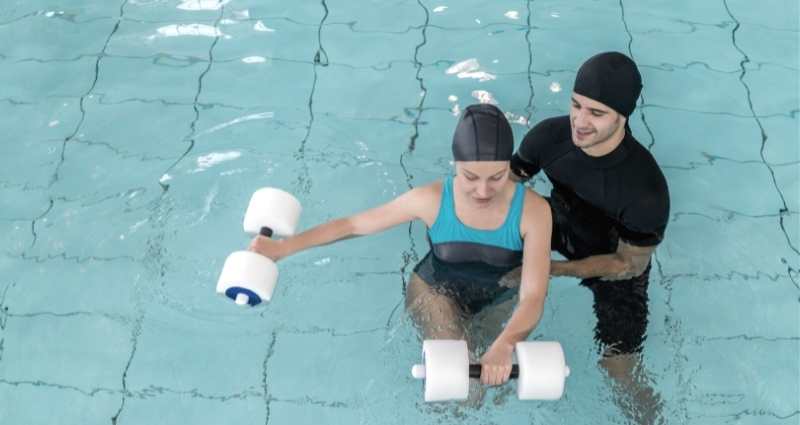by Matt Regan, SPT

Aquatic Exercise Therapy Program
What is it and is it right for you?
Although pools provide a great way to have fun with friends and family, it also serves a purpose in the rehabilitation world. Aquatic exercise is the utilization of exercise while submerged in water. It has been growing in popularity recently but has actually been utilized for thousands of years. There are many properties of water that can be used to a patient’s advantage. However, aquatic therapy can be dangerous for some individuals and should be avoided dependent on their diagnoses.
Properties of Water
- Relative Density: the ratio of an object’s weight to the weight of an equal volume of water. When you hold your breath, you may find yourself floating at the water’s surface. When you let that breath all the way out, you may find yourself sink to the bottom.
- Buoyancy: When submerged in water at rest, there is an upward thrust placed on the body which acts in the opposite direction of gravity. Buoyancy can be assistive, resistive, and supportive depending on how you take advantage of the force.
- Viscosity: Resistance of movement through a fluid.
- Hydrostatic Pressure: At a specific depth, fluid pressure is exerted on all surfaces of a body equally. The deeper you go, the more resistance there is.
- Temperature: When performing vigorous exercise in a pool, it is recommended the pool be between 82-86°F. For more therapeutic and relaxing effects, the pool should be kept at 91-95°F.
- Refraction: When light travels from air into water, the light ray bends because of the differing densities. In other words, it is more difficult to use the sense of vision to determine where your body is in space.
Rehabilitative Effects
- Relaxation and soothing effects on aching muscles and joints
- Muscle Strengthening
- Kinesthetic awareness training
- Proprioception training
- Reduced weightbearing forces
- Reduced effects of gravity
- Stabilization of unstable joints
- Respiratory strengthening
- Edema control
Contraindications to Aquatic Exercise
- Fever or infectious disease
- GI disorders or incontinence
- Kidney disease
- Epilepsy/seizures
- Abnormally high/low blood pressure
- Current or recent radiation therapy (within 3 months)
- Impaired lung vital capacity between 900-1500mL
- Open wounds
- Perforated eardrums
- Heart failure
- Typhoid fever
- Cholera
- Dysentery
If you have an injury or a condition that may benefit from an aquatic therapy program, contact us at Capital Area Physical Therapy at one of our 3 Capital Region physical therapy clinics in Saratoga, Malta or Queensbury. Our experienced therapists will evaluate your pain and functionality and work with you to put together a personal PT plan.




